40 years of Gulzar’s Namkeen – A house in the mountains, a family of women, and a peripatetic truck driver
Gulzar's adaptation of Samaresh Basu’s short story won numerous awards for its cast and crew
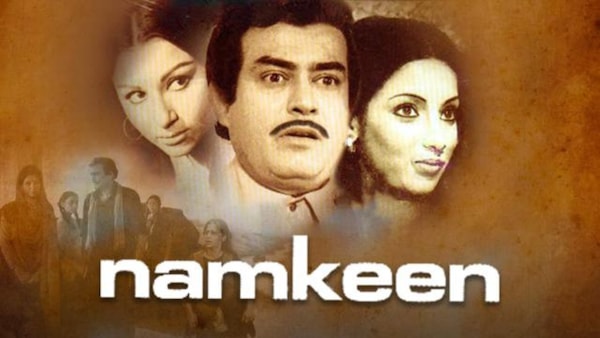
Last Updated: 12.46 AM, Jan 03, 2023
Poet, lyricist, writer and director Gulzar has an enduring connection with Bengali culture. It extends to his choice of source material for some of the films and television series he has helmed as director. One such association was with the stories of Samaresh Basu that he adapted for the visual medium – Kitaab (1977) based on Basu’s Pathik, Namkeen (1982) from Akal Basant, and a few episodes of the television series Kirdar in the 1990s were adapted from other stories by Basu.
A house in the mountains
In Namkeen, Gerulal (Sanjeev Kumar), a truck driver, is stranded in a village in Himachal Pradesh. He rents a room in a ramshackle one-storey house from an old woman called Jugni (Waheeda Rehman). Jugni, a former nautanki dancer, ekes out a living pounding whole spices into masalas, patting dung, and renting out her spare room.
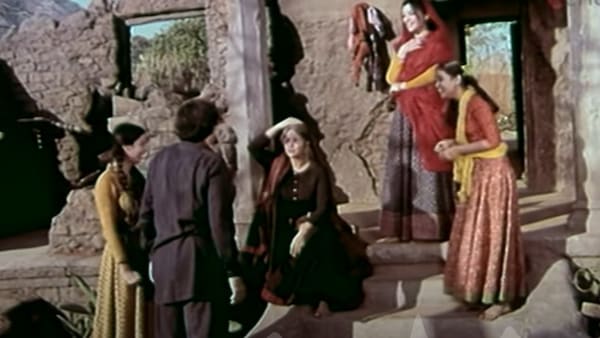
Jugni's three daughters assist her in pounding masalas, and possess personalities akin to flavours – Nimki the salty one (Sharmila Tagore) is prone to tears, Mithu, the sweet sister (Shabana Azmi) is the dreamer, and Chinki is the tart one (Kiran Vairale).
The villagers regard the daughters as tainted by misfortune because there is no man in the household to get them married. While this hints at an unravelling to come, one might wonder if the family's misfortunes are less about the hand of fate but more likely from the lack of social support in a patriarchal rural milieu.
The man of the house
Gerulal is initially at loggerheads with the whimsical women who run this curious household but soon discovers that each of them has an ardent wish, often tinged by personal tragedy.
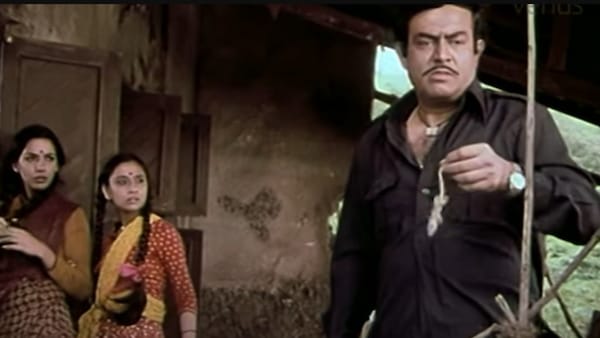
Nimki (Sharmila Tagore) is the self-sacrificing unmarried older sister past the prime of her youth, who wants only the wellbeing of her mother and sisters. Gerulal is drawn to her and even writes to his grandmother in his village that she would make for a good daughter-in-law for their home.
When Gerulal finds Mithu (Shabana Azmi) writing poetry about a ‘badra bidesi’, a cloud that has flown in from afar, he is unaware that she may be alluding to him. Gerulal once snaps at Mithu asking if she is mute. Nimki then confides in him that Mithu did indeed lose her ability to speak after being kidnapped as a child.
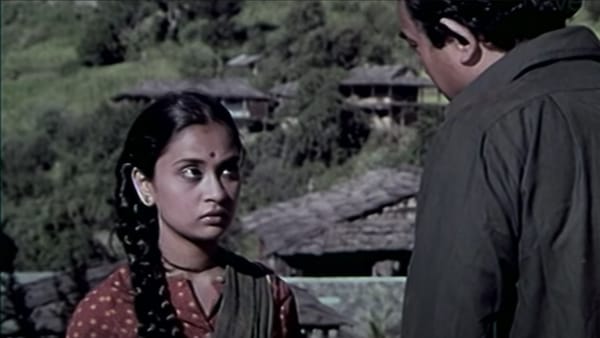
Chinki (Kiran Vairale) is the sprightly teen who is petulant about not being allowed to roam the alluring world outside the safe confines of her home. Gerulal treats her like an older brother would, teasing her, and ordering her around, while also being fiercely protective of her.
Jugni often forgets that she has a tenant, and often accosts Gerulal, asking him to identify himself. When a nautanki troupe passes through the village one day, Jugni frantically locks up her daughters. She confides in Gerulal her fear that the father of her daughters, Kishanlal (Ram Mohan), a Sarangi player, will take them away to the big bad world of nautanki. Gerulal discovers that it was Kishanlal’s attempt at kidnapping Mithu as a child, that had traumatised her, rendering her mute. Gerulal develops respect for Jugni for the way she rages alone against the world to keep her daughters safe.
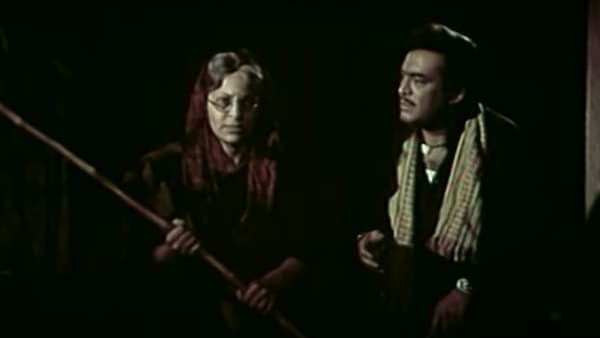
Gerulal emerges as a decent man in a harsh society who is comfortable revealing his vulnerabilities to those he regards as family. When circumstances force Gerulal to leave the village overnight, he proposes marriage to Nimki, but she refuses. She believes herself to be the thread that holds the fabric of the family together, and that it would unravel without her. She urges him instead to choose Mithu, but he confesses that he couldn't possibly see her as a prospective wife. Gerulal leaves behind his village address and asks Nimki to write to him.
The vagabond cloud
There are peripatetic characters aplenty in Hindi cinema, usually introduced in song as a ‘raahee’ (pedestrian), a ‘musafir’ (traveller), and even an ‘awara badal’ (vagabond cloud). Gulzar too, introduces some of his characters thus. Ravi (Jeetendra) from Parichay (1972) sings of building a settlement on the wings of a breeze in ‘Musafir hoon yaaron’. In the title sequence of Mausam (1975), ‘Dil dhoondta hai’ evokes the protagonist’s wistfulness at returning after many years to Darjeeling, where he first fell in love.
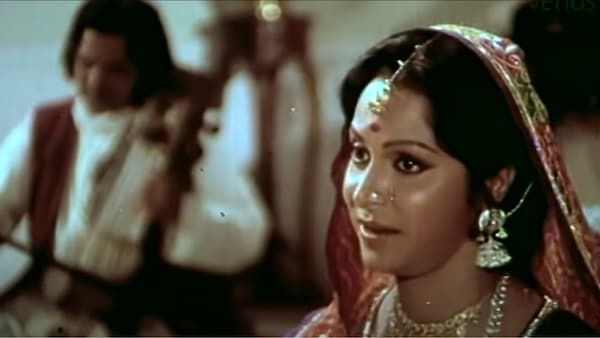
In Namkeen, it would be logical to introduce Gerulal's character in the song, 'Raah pe rehte hain', at the beginning of the movie, when he arrives. But the song’s placement holds more poignancy when he leaves, reminding the audience, the family of women, and Gerulal himself, that he was always bound to be on the move. The song, although upbeat to listen to, visually amplifies Gerulal’s sorrow at having to abandon this idea of home and family that he had briefly nurtured.
Return to the mountains
Three years later, Gerulal visits a nautanki in a village he is passing through and is alarmed to see the suggestively dancing performer. Chinki now works with her father, Kishanlal in a nautanki troupe. She was perhaps the most street-smart of the sisters but has now become a world-weary cynic. Chinki tells Gerulal that she left home because she refuses to follow in the footsteps of the self-sacrificing women of her family. She confesses that while he wasn’t the first man they had hoped would stay, she had certainly invested more hope in his not abandoning them.
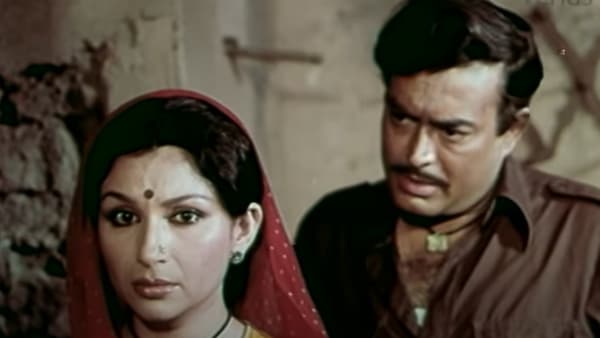
When Gerulal returns to the house in the mountains to see Nimki, she is inconsolable. He learns that a few months after he left, Mithu had lost her mental balance and one day plunged to her death from a mountaintop. (It could also be inferred that Kishanlal may have tried to abduct Mithu once again, thereby triggering her trauma. Chinki had then left with him, perhaps making this her unwitting or secret sacrifice for the family.) Mithu’s loss devastated Jugni and she wasted away in grief. Chinki left home, and Nimki tells Gerulal that she would wait for Chinki’s return.
Gerulal steps up to take responsibility for Nimki. He withholds from Nimki the truth about Chinki being part of a nautanki, and assures her that her little sister now lived on her own terms. With no family that binds Nimki to the house in the mountains, she leaves behind her life of salty tears to build a new life with Gerulal.
Namkeen can be considered a social drama, but Gulzar infuses humour to buffer the weight of the theme, especially in the scenes featuring Gerulal’s initial challenges in settling in, the banter between the characters, and even in the playful lyrics of the song, ‘Aanki chali, baanki chali’.
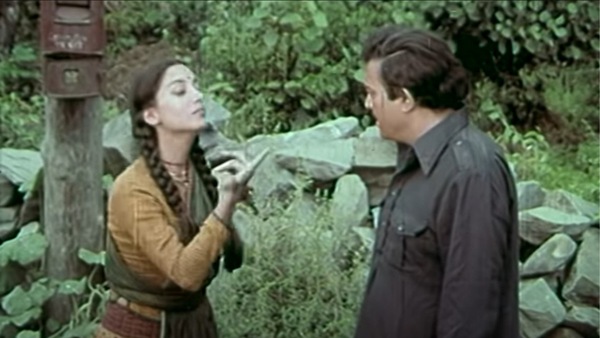
Gulzar employs the women’s sartorial choices as a subtle differentiator. Jugni, in her younger years as a dancer in the nautanki, wears garish sequinned clothes, and years later, Chinki follows in her footsteps. At the time of Gerulal's stay, the now-old Jugni is a far cry from her younger years, now wearing drab attire as though eager to not draw attention to herself. Jugni's daughters are in the bright colours of youth but sans the garish commodification of the nautanki costumes.
With its soulful lyrics and lilting melodies, Namkeen's music is yet another milestone in the Gulzar-R.D. Burman partnership. Apart from the bittersweet 'Raah pe rehte hain', ‘Phir se aiyo badra bidesi’ captures Mithu’s dreamy wanderings in the mountains, and ‘Aanki chali, baanki chali’ captures the wordplay and banter of the sisters as they go about their day pounding spices.
(Views expressed in this piece are those of the author, and do not necessarily represent those of OTTplay)
(Written by Saritha Rao Rayachoti)
